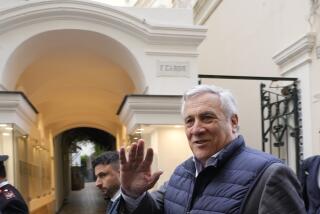Clinton Signs Bill Aimed at Foreign Firms in Libya, Iran
Acting over protests of European allies, President Clinton on Monday signed a measure to punish foreign companies that do business with Iran and Libya.
He said the United States has an obligation to act--alone if necessary--against what he branded “two of the most dangerous supporters of terrorism in the world.”
Clinton signed the bill in an Oval Office ceremony flanked by family members of several victims of the attack on Pan Am Flight 103, a jet that was blown up over Lockerbie, Scotland, in 1988. The administration wants two Libyans suspected of complicity in the bombing extradited for trial in the U.S.
Later, in a foreign policy address, Clinton recalled recent terrorist attacks against the United States--including the June bombing of a U.S. housing complex in Saudi Arabia--and dedicated the nation to a “long, hard struggle” against global terror, calling it “the enemy of our generation.”
The law punishing firms doing business with Iran and Libya is expected to have limited economic impact and little effect on the behavior of those two nations, which have suffered partial Western economic embargoes for years. But the measure gave Clinton the chance to appear determined to battle terror on all fronts at a time of heightened domestic concern about terrorism after the Olympic park bombing, the unresolved case of TWA Flight 800 and the Saudi attack.
In his speech at George Washington University, Clinton cited his signing of the Iran-Libya sanctions bill as the lonely obligation of the U.S. as the world’s “indispensable nation.” He acknowledged the opposition of Germany, France and other allies who object to what they consider interference in their trade.
The European allies share the U.S. belief that Iran and Libya support global terrorist groups with money, arms and training. But the Europeans contend that isolating the regimes is counterproductive and advocate a policy of commercial engagement coupled with diplomatic pressure to stem terrorism.
Clinton said the U.S. disagrees, believing a total quarantine of rogue states is the only answer. “Where we don’t agree, the United States cannot and will not refuse to do what we believe is right. . . . You cannot do business with countries that practice commerce with you by day while funding or protecting the terrorists who kill you and your innocent civilians by night.”
Reaction from the European Union came swiftly. Leon Brittan, EU vice president and chief trade negotiator, said Europe shares America’s shock at the bombing of the U.S. military installation in Saudi Arabia and the crash of TWA Flight 800. But he criticized the bill Clinton signed Monday, saying: “It established the unwelcome principle that one country can dictate the foreign policy of others and disturbs the unity of purpose between allies that is so necessary if we are to stamp out terrorism successfully together.”
Then, delivering a barely shrouded threat to ignore the U.S. law, he added: “The EU has already said it will act to defend its rights and interests if they are jeopardized by this legislation.”
The 15-nation EU imports roughly 20% of its oil from Iran and Libya, and its oil companies have extensive investments in both countries.
Clinton, anticipating the criticism, said in his speech: “I hope and expect that before long, our allies will come around.”
The measure requires the president to impose sanctions on foreign firms that invest $40 million or more in a year in energy enterprises in Iran or Libya. The bill does not affect existing contracts, only new ventures, officials said. Libya and Iran are both on the State Department list of countries supporting terrorism, and U.S. law bans trade by American firms with both.
Clinton said the new measure, sponsored by Sen. Alfonse M. D’Amato (R-N.Y.), “builds on what we’ve already done to isolate those regimes by imposing tough penalties on foreign companies that go forward with new investments in key sectors. The act will help to deny them the money they need to finance international terrorism or to acquire weapons of mass destruction.”
Yves Doutriaux, a spokesman at the French Foreign Ministry, responded that the law will “create a particularly dangerous precedent for the security and development of commerce.” He and other European officials said EU nations were debating retaliation against the U.S. for the new act. The EU already is preparing countermeasures against a recently signed U.S. law penalizing foreign firms that invest in property that the Cuban government confiscated from U.S. citizens.
Two French oil companies, Elf-Aquitaine Inc. and Total, do business in Iran and Libya. But they said that since the new U.S. law will apply only to new business deals, they don’t expect to be immediately affected.
Germany, with significant trade with Iran, has been one of the most outspoken proponents of engagement with Tehran. Bonn has repeatedly argued that such a policy gets better results than U.S.-style isolation.
Washington has long been critical of the German policy, but Bonn was able to point to a policy success in July, when the Iranian-backed Shiite Muslim guerrilla group Hezbollah returned the bodies of two Israeli soldiers missing for 10 years. In exchange, Israel returned more than 100 Hezbollah corpses and freed a number of jailed Shiites. The swap was brokered by Germany’s intelligence chief.
Broder reported from Washington and Walsh from Berlin.
More to Read
Start your day right
Sign up for Essential California for news, features and recommendations from the L.A. Times and beyond in your inbox six days a week.
You may occasionally receive promotional content from the Los Angeles Times.






